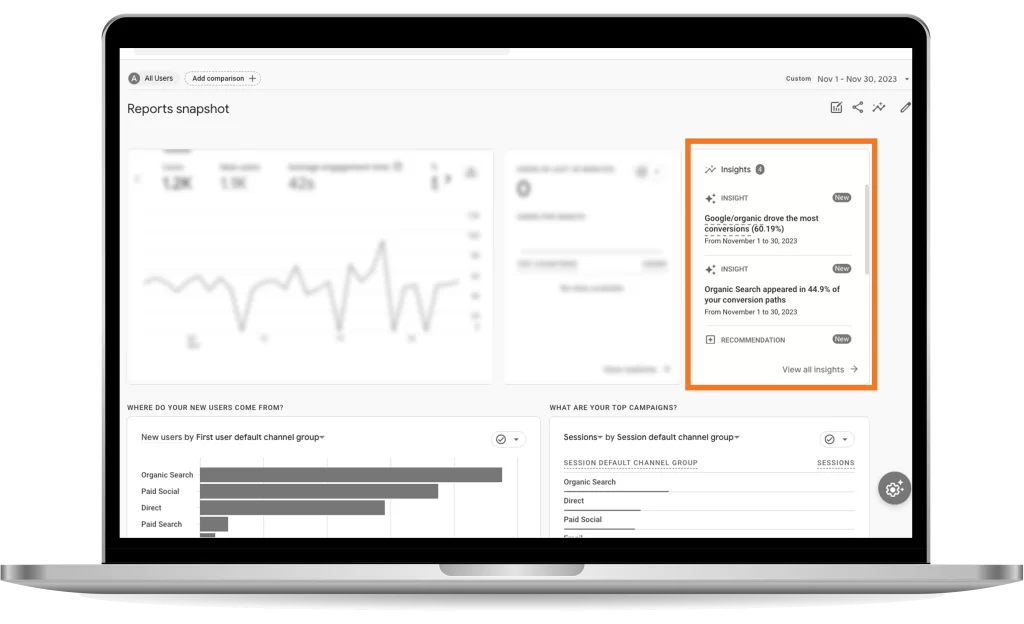The Role of Machine Learning in Google Analytics 4: Implications for Marketers
By advertience | December 7, 2023 | Google Analytics 4
Unlock the potential of Google Analytics 4 with Machine Learning. Transform your marketing strategy with predictive insights. Act now!

Understanding GDPR
Google Analytics 4 (GA4)’s architecture, distinct from its predecessor, incorporates Machine Learning (ML) at its core, enabling the identification of intricate patterns, trends, and anomalies in large datasets. This technical capability translates into a more granular understanding of user behavior and site performance for marketers
Predictive Modeling
- Regression Analysis: Used for predicting continuous outcomes like estimated revenue, this enables marketers to forecast long-term customer value, optimizing budget allocation for customer acquisition and retention.
- Classification Algorithms: Employed for categorical predictions, such as user segmentation based on likely actions. Marketers can use this to tailor campaigns, predict user responses, and optimize ad targeting strategies.
Anomaly Detection
Statistical Process Control and Time Series Analysis: These tools identify significant deviations from normal patterns. For marketers, this means the ability to quickly respond to unexpected changes, like traffic drops or surges, potentially signaling market shifts or technical issues.
Data Gap Filling
Propensity Score Matching and Bayesian Methods: These techniques are crucial in a privacy-centric environment. They enable marketers to estimate user behavior and fill in data gaps, maintaining robust analytics despite increasing privacy regulations and the phasing out of third-party cookies.
Implications for Marketers
01
Enhanced Data-Driven Decision-Making: GA4’s predictive analytics allow marketers to anticipate future trends and customer behaviors, facilitating more informed strategic decisions.
02
Real-Time Market Adaptation: Anomaly detection empowers marketers to respond swiftly to market changes, maintaining the relevance and effectiveness of their campaigns.
03
Navigating Privacy Regulations: The ability to fill data gaps while complying with privacy laws ensures that marketers can rely on their data’s integrity, a crucial factor in today’s privacy-focused digital landscape.
04
Resource Optimization: Automated insights and anomaly detection liberate marketers from the burden of manual data analysis, enabling them to concentrate on strategic, high-impact activities. These automated insights are conspicuously presented on the dashboard in intuitive graphical formats, thus obviating the necessity for advanced technical expertise to effectively exploit the data. Powered by sophisticated machine learning algorithms, these insights continuously monitor your data, meticulously detecting any substantial fluctuations or nascent trends

05
Continuous Learning and Adaptation: As ML algorithms in GA4 evolve, they offer progressively sophisticated insights, necessitating marketers to continually adapt their strategies to stay ahead.
Understanding the role of Machine Learning (ML) in Google Analytics 4 (GA4) is crucial for marketers in today’s data-driven digital marketplace. The integration of ML in GA4 offers a robust platform that demands a deep understanding of data science for effective application in marketing strategies. For Advertience, a digital marketing agency, this integration is not just about adapting to a new technology but about leveraging it to provide superior services. As an agency that offers GA4 audit services, Advertience is uniquely positioned to help clients optimize their GA4 setup, ensuring data integrity and aligning analytics with specific marketing goals. Their expertise in GA4, enhanced by ML capabilities, allows them to offer tailored strategies and advanced optimization techniques. By doing so, Advertience enables its clients to fully exploit the potential of GA4, ensuring that their marketing strategies are not only data-driven and aligned with current trends but also adaptable and forward-looking, keeping pace with the dynamic nature of the digital marketing landscape.




